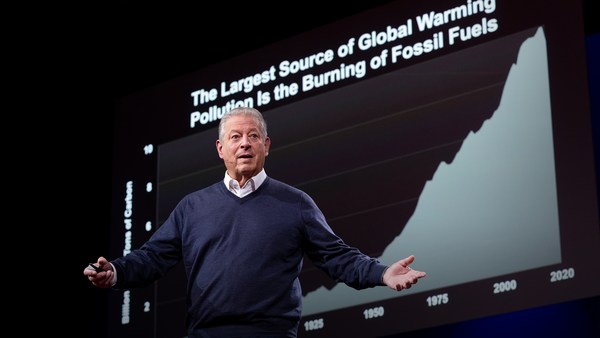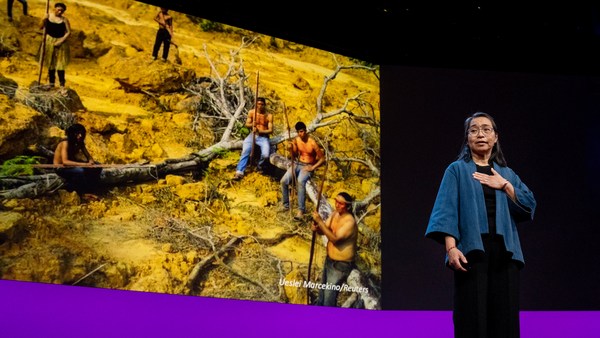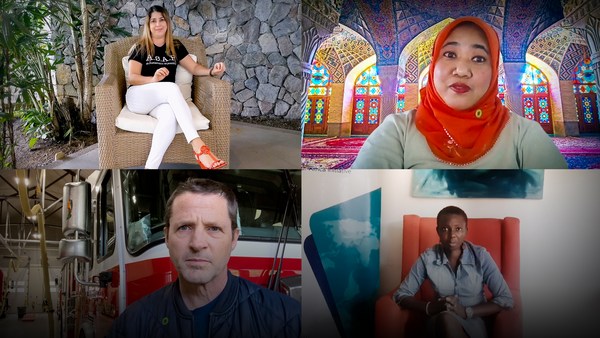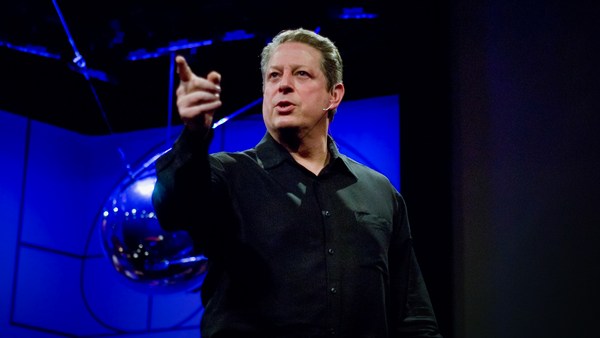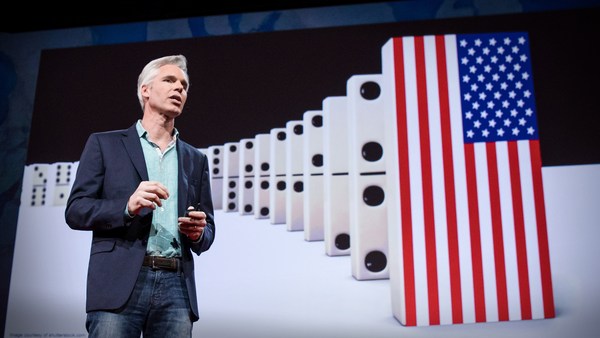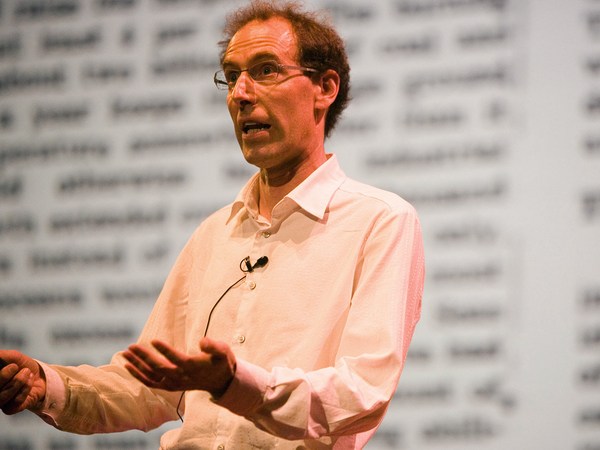Al Gore: Thank you very much.
Whitney Pennington Rodgers: Hi, Al. Thank you so much for being here. Just as I mentioned, you gave a rousing talk at Climate Countdown last fall about all of the things that we need to do to transform climate change and to turn things around here. What would you say is the state of play with climate action now, six months later?
AG: Well, thanks in part to many of the people that are part of the TED community, we've seen tremendous progress in the development of affordable, cheap, solar electricity, wind electricity, electric vehicles, batteries, regenerative agriculture, green hydrogen is coming along, sustainable forestry. But unfortunately, the crisis is getting much worse, much faster than predicted. And it is getting worse at a rate faster than the rate at which we're deploying these solutions. We have everything we need, save sufficient political will. It's been that way for a while.
And just since the Glasgow conference, we have seen a lot of backsliding and we've seen financial institutions, banks and large investors, pumping more and more and more money into more and more fossil fuels. It is quite literally insane. Today, we will put another 162 million tonnes into the thin shell of atmosphere surrounding the planet. And the accumulated amount now traps as much extra heat as would be released by 600,000 Hiroshima-class atomic bombs exploding every 24 hours. Just, you know, 95 miles northeast of here in Lytton, British Columbia, it reached 121.3 degrees less than a year ago. 49.6 Celsius. More than 80 all-time high temperature records were broken here in British Columbia just in less than a year ago. One day later, by the way, the entire town burned up. Yesterday, massive death in the Philippines from another superstorm fueled by the climate crisis. Chile just yesterday declared a drought emergency.
But we are seeing the development of the solutions. Unfortunately, the financial interest, the fossil fuel companies, have captured the policy-making process in key countries and have intentionally zombified as many people as they can around the world with false messaging that they knew was false. They knew it, it's been proven to a fare-thee-well. And as a consequence, our political decision-making process in key countries is locked, paralyzed.
So the political will necessary to break through this has to be expressed in a much more effective way. We are nearing a political event horizon. And in the United States, JP Morgan Chase, Citi, Wells Fargo ... Others, Bank of America, Royal Bank of Canada here ... Several banks in Canada joined the Net-Zero Banking Alliance, and then last year they doubled the amount of money pumped into the tar sands, which is the dirtiest form of fossil fuels. You know, when junkies can't use the veins in their arms and legs anymore, they shoot between their toes. That's what the tar sands is like.
So I want to say that this is a moment when we have to rise to this occasion. Abraham Lincoln said the occasion is piled with difficulty, piled high with difficulty, and we have to rise with the occasion. As our case is new, we must think anew and act anew. We have to find ways to solve the democracy crisis in order to solve the climate crisis.
(Applause)
WPR: Well, you know, I think with the war in Ukraine, we're now seeing the question of energy security being brought center-stage. And I'm curious what you think that will do in terms of accelerating or decelerating the energy transition?
AG: Yeah, well, this should be a moment of global epiphany. This is a fossil fuel war, as many have said. And the timidity of some European countries, understandably, because they are so dependent on Russian gas and oil, is another consequence of our dependence. And then we see this horrible scene where the United States goes begging other petrostates, like Saudi Arabia and Venezuela and Iran, to pump up more and more fossil fuels. We should see this as a threat to national security and global security. It is a threat to disadvantaged communities. I mean, the coal pollution from burning fossil fuels kills nine million people every year. A large multiple of the number of people killed by COVID are killed annually by the particulate pollution that comes from fossil fuels. We can save money, we can fight inflation, by the way. The sustainability revolution, including renewable energy, is massively deflationary. The cost continues to go down. There are multiple reasons why we should see this as a moment of decision to make a big change and get off of fossil fuels. We can't keep pumping more and more money in pursuit of short term profit in activities that are destroying the future of humanity. This is not a time for moral cowardice. This is not a time for surrender and reckless indifference to the fate of humanity.
WPR: I think in thinking about this being a time for change, the IPCC recently put out a report where they said that if we do want to come around the bend, that we have until 2025 to see CO2 levels peak. I mean, that's just three years from now. How realistic do you think that actually?
AG: Well, actually, what they said, it needs to peak between 2020 and no later than 2025, yes.
First, let me share some good news from that dire IPCC report. They also said if we reach net-zero, true net-zero, then the temperatures on our planet will stop going up with a lag of as little as three to five years. And if we stay at net-zero, half of the human-caused CO2 in the atmosphere will fall out of the atmosphere in as little as 25 to 30 years. We have the technologies, we have the solutions, we have the ability to stop this progressive destruction of the future of humanity and start the long healing process. But we have to break through the capture of our political systems. They say boycotts don't work. Should we boycott all of these banks and all of these financial institutions?
(Applause)
You know, scientists, climate scientists, some of them announced last week and started doing this, gluing themselves to the doors, to the gates of these fossil fuels facilities. If climate scientists have reached the conclusion that more facts and more data and more research is of absolutely no good unless we, the people, can find the means to break through the imprisonment of our self-determination on the part of large, massive polluters who are just looking at profits, then the scientists say they have to go into the streets. So I'm sorry to get all hot and charged-up about this.
WPR: I think everyone appreciates it.
(Applause and cheers)
AG: But yes, what the IPCC report -- I mean, you know, it's an asymptotic curve that gets closer and closer to absolute panic, OK? And all the reports are very similar.
This is real. You know, Voltaire once said, if you can convince people of absurdities, you can convince them to commit atrocities. We are seeing that in Ukraine today. We are seeing that on a global basis with this reckless indifference to the future of humanity. What will we say to the next generations when they look back and see, you had the chance to do this?
We have the means. The International Energy Agency, says that in order to cut emissions by 50 percent in 2030, we have all of the technologies we need, fully developed, with deployment plans that have been proven to work. For the next 50 percent between 2030 and 2050, all of the technologies are in various stages of development. They can be ready if we decide to develop them quickly enough, they will be ready. We have to stop destroying our future. It sounds so simple, but we have to break through this paralysis.
WPR: Well, we have to break through this paralysis. Ladies and gentlemen, Al Gore.
AG: I have one other thing to say, and I've said this before. Do not give up hope. And remember always, that political will is itself a renewable resource.
Thank you.
WPR: Thank you so much, Al.
(Applause and cheers)
